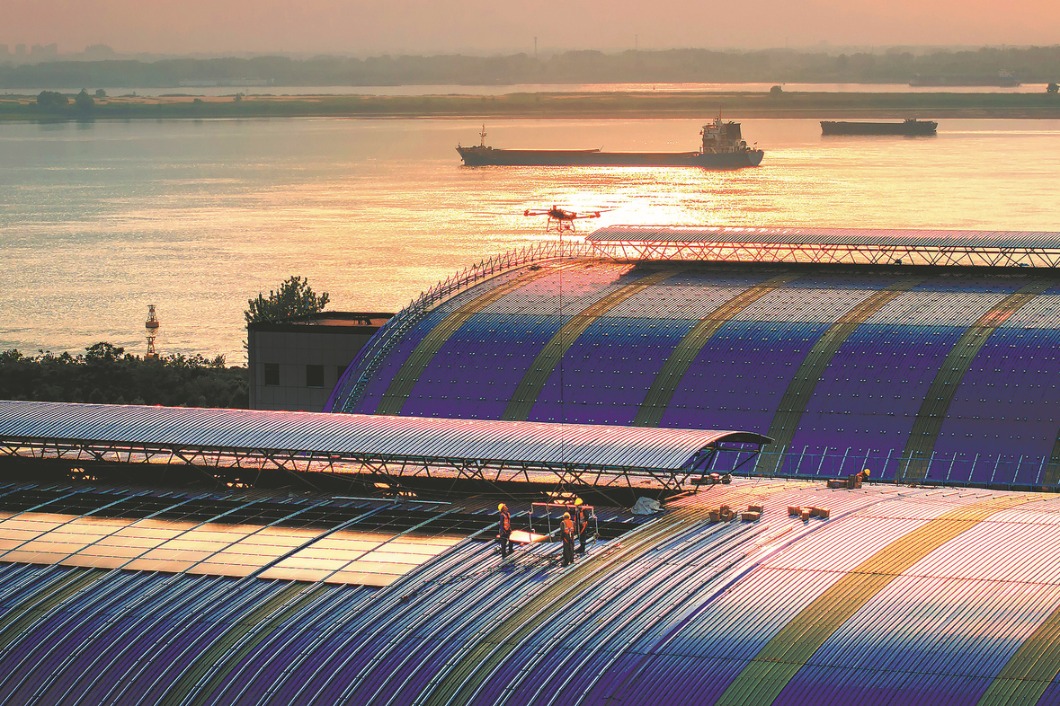Water governance strengthened


As the just-concluded 20th National Congress of the Communist Party of China pointed out, China's modernization requires harmony between humankind and nature.
Water is the source of life and the basis of civilization. And China is a country that has a complex water system and faces the most arduous task when it comes to water governance. Water governance is of special importance to China's ecological protection and socioeconomic development, and closely related to Chinese people's well-being.
The central leadership has urged the people and governments at all levels to make water saving a priority, and asked all government departments to practice systematic governance, prevent water-related disasters, and conserve water sources in a coordinated and all-around way.
Adhering to the principle of putting people first, and taking the worst-case scenario into consideration, China has always accorded the highest priority to protecting people's lives and property.
In the past 10 years, China's flood- and drought-prevention capability has improved significantly, and it has successfully managed serious floods in the Yellow River, Yangtze River, Huaihe River, Haihe River, Pearl River, Taihu Lake and other large river and lake regions. The average annual loss due to floods as a percentage of GDP has declined from 0.57 percent in the 2002-12 period to 0.31 percent over the past decade.
The launching of a large number of water conservancy projects has helped lower the magnitude of floods, maintain regular water supply, minimize saline water tides, strengthen weak links in ecological governance, and fight droughts. Also, the implementation of non-engineering measures has helped improve weather forecasts, early warning, and pre-planning to deal with rain- and flood-related disasters.
Besides, the digitalization of China's watershed monitoring system has expedited the process of smart simulation and decision-making in flood- and drought-related disaster prevention.
Also, ensuring water safety has played a key role in the eradication of extreme poverty. In the past 10 years, about 280 million rural residents have got access to safe drinking water. The area under effective irrigation has reached 1.037 billion mu (69.1 million hectares), and tap water has reached 84 percent of rural residents. The dream of hundreds of millions of farmers of having access to clean drinking water has been realized. All this has helped the country win the battle against extreme poverty and lay a solid foundation for rural revitalization.
The past 10 years have also seen the Chinese people make water saving a priority, leading to major changes in the way people use water. The implementation of the water-saving action plan has advanced with the construction of institutions and introduction of lessons in schools to promote water saving.
Besides, China's water consumption per 10,000 yuan ($1,372.90) of GDP and 10,000 yuan of industrial added value in 2021 had decreased by 45 percent and 55 percent respectively compared with 2012, and the effective utilization coefficient of water for irrigation increased from 0.516 in 2012 to 0.568 in 2021.
While striking a spatial balance between water demand and supply has helped optimize the national water resources allocation pattern, the first phase of the East and Middle Routes of the South-to-North Water Diversion Project has been completed, and the development of the follow-up projects accelerated.
Furthermore, the water supply capacity of national water conservancy projects increased from 700 billion cubic meters in 2012 to 890 billion cubic meters in 2021, while the total water consumption in the country has remained basically stable. In fact, China provides safe drinking water to nearly 20 percent of the world's population with just 6 percent of the world's freshwater. Not only that, despite its scarce water resources, China accounts for more than 18 percent of the world's economic aggregate.
China has been able to make these achievements because of the country's visionary leadership, and its decision to better protect the country's water resources and make water saving a national priority.
"Kind people love the mountains, the wise love water," as a saying goes, and it takes both types of people to protect water resources and prevent the waste of water. In fact, people have realized that rivers and lakes are not only natural assets, but also cultural resources.
The past decade has also seen the State carry out the mother river recovery action plan, implement the "one river, one policy", and establish a river chief system and a lake chief system. As a matter of fact, about 1.2 million river chiefs have been appointed, making sure "every river has a river chief".
In the Yangtze River Economic Belt, the government has introduced the policy of "large-scale protection, not large-scale exploitation", which has been accepted by the people. And the ecological protection and high-quality development of the Yellow River Basin has become part of the national strategy.
Moreover, a large number of problems related to heavy downpours and floods, water ecology, and water resources have been solved, and the appearance of rivers and lakes has undergone historic changes, greatly improving the living atmosphere.
In short, in the past 10 years, China's capability to prevent floods, deal with droughts, save water, optimize the allocation of water resources, and protect the ecology of large rivers and lakes has significantly improved, helping enhance people's sense of gain and happiness.
However, China needs to further improve its flood-control engineering system, launch more national water network projects, revive the ecological environment of rivers and lakes, improve the water conservation mechanisms and policies, and strengthen water management, in order to build a modern socialist country in all respects.
The author is a member of the Chinese Academy of Engineering and dean of the National Strategic Research Institute of Yellow River Basin, Shandong University.
The views don't necessarily reflect those of China Daily.


































